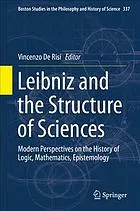Leibniz and the Structure of Sciences: Modern Perspectives on the History of Logic, Mathematics, Epistemology
4.0
Reviews from our users

You Can Ask your questions from this book's AI after Login
Each download or ask from book AI costs 2 points. To earn more free points, please visit the Points Guide Page and complete some valuable actions.Introduction
Welcome to the exploration of Leibniz's intellectual legacy in "Leibniz and the Structure of Sciences: Modern Perspectives on the History of Logic, Mathematics, Epistemology." This book offers a comprehensive look at the profound impact of Gottfried Wilhelm Leibniz on contemporary thought and the enduring relevance of his ideas across diverse scientific disciplines.
Detailed Summary of the Book
The book is an in-depth analysis of the intricate philosophies and theories proposed by Gottfried Wilhelm Leibniz, one of the most influential thinkers of the early modern period. It delves into the integration of logic, mathematics, and epistemology in Leibniz's work, showcasing how he laid the foundational stones for numerous modern scientific inquiries. Through a collection of essays by distinguished scholars, the text examines how Leibniz's ideas preemptively addressed 21st-century issues in science and philosophy.
By dissecting his writings, the book highlights Leibniz's innovative thoughts on the theory of knowledge, revealing his attempts to formalize logic through mathematical structures, an endeavor that presages contemporary computational theories. Additionally, the book discusses Leibniz's vision of a universal language and his dream of a universal calculus — the “calculus ratiocinator” — which paved the way for modern computer science.
Key Takeaways
- Leibniz's vision of logic and mathematics was far ahead of his time, anticipating many modern developments in computing and information theory.
- His philosophical inquiries explored the nature of truth and knowledge, offering insights that contribute to current philosophical debates.
- The book elucidates on Leibniz's influence on future generations, including his subtle yet powerful impact on 20th and 21st-century scientific methodologies.
- Leibniz's aim to develop a universal characteristic—a language capable of describing all forms of scientific thought—remains profoundly significant in today’s interdisciplinary scientific discourse.
Famous Quotes from the Book
"Leibniz's intellectual oeuvre is a testament to the human potential for innovation and creativity, bridging the gap between the intuitive and the rational."
"Understanding Leibniz's vision is to appreciate the woven tapestry of logic, mathematics, and philosophy that anticipates the fabric of today's sciences."
Why This Book Matters
The book is essential for anyone interested in the history of science and philosophy because it sheds light on how historical perspectives continue to influence contemporary scientific paradigms. Understanding Leibniz's multidimensional approach provides a unique framework for addressing today's complex scientific challenges. The detailed exploration of his work propels discussions in logic, artificial intelligence, and theoretical computer science, thereby reinforcing Leibniz’s timeless relevance in our digital age.
Moreover, the text encourages readers to explore the intersections of different disciplines, reflecting Leibniz’s belief that the synthesis of knowledge across fields leads to greater understanding. As such, this book is not just a homage to a historical figure, but a clarion call to rethink how knowledge is structured, disseminated, and expanded upon in the modern world.
Free Direct Download
Get Free Access to Download this and other Thousands of Books (Join Now)
For read this book you need PDF Reader Software like Foxit Reader


